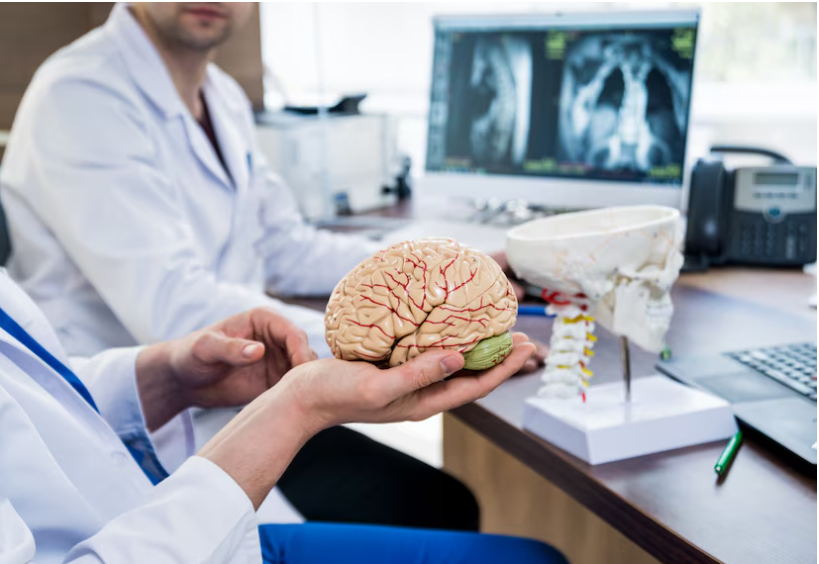
Tuesday, 2 July, 2024
You should be aware of the different types, causes, symptoms and treatment approaches of brain tumour to be able to tackle it well.
When you are more informed, it becomes easy to manage this complex condition affecting your brain.
Let’s dive into the world of brain tumour and explore it in detail.
First thing first, what is brain tumour? A brain tumour is an abnormal growth of cells in or around the brain. Some tumours are benign (non-cancerous) and grow slowly, while others are malignant (cancerous) and can grow quickly and spread to other parts of the brain or body.
Types of Brain Tumour
When it comes to brain tumours, you must understand the different categories of this condition. Brain tumours are divided into two main categories based on their origin:
Primary Brain Tumours
These stem from the brain itself, hence the name primary brain tumour. While some of these can be benign which means non-cancerous, others could be malignant, that is cancerous too.
Here are the most common types of primary brain tumours:
-
Gliomas:
These tumours originate from glial cells. Wondering what are glial cells? Well, the cells which support nerve cells in the brain are glial cells and tumours which arise from these glial cells are termed as Gliomas. These can be further divided into astrocytomas, oligodendrogliomas, and ependymomas, depending on the specific type of glial cell they originate from. -
Meningiomas:
Meninges are the protective membranes that shield your brain and the spinal cord. When tumours occur from the meninges, they are called Meningiomas. While they are mostly benign, in some very rare cases these could become malignant. -
Pituitary Adenomas:
As the name suggests, Pituitary Adenomas are generated in the pituitary gland, right at the base of the brain. Clinging on to the pituitary gland, these tumours can affect the function of your pituitary gland - regulation of various hormones in your body. These tumours are usually benign. -
Schwannomas:
Developed from the Schwann cells, these tumours may affect your hearing and balance. Schwann cells generate the myelin sheath that covers your nerve fibres and these tumours specifically affect those nerves which are responsible for your hearing and balance.
Metastatic Brain Tumours
Also known as secondary brain tumours, metastatic brain tumours are the second kind of brain tumours. They grow from the cancer cells that are spread to the brain from other body parts, like lung cancer, breast cancer, melanoma, and kidney cancer. This means metastatic brain tumours are all malignant, that is cancerous.
Also, compared to primary brain tumours, metastatic tumours are more common to find.
Causes of Brain Tumours
Unless you know the causes of a condition, it becomes challenging to manage it. And brain tumours are no exception.
According to the expert doctors at Kauvery Hospital, the best neuro hospital in Bangalore, the exact cause of brain tumour is still not clear. However, they highlight certain factors that could contribute to the growth of brain tumours.
Here are some of them. Read through to assess and prevent brain tumours better.
-
Genetic Mutations:
Any changes or mutations in your DNA cells can result in cell growth that cannot be controlled. This could lead to an occurrence of tumour. Genetic conditions like neurofibromatosis and Li-Fraumeni syndrome are often observed to amp up the risk of brain tumours. -
Environmental Factors:
When you are exposed to high levels of radiation, it could make you more vulnerable to brain tumours. In case you have undergone radiation therapy that’s used to treat cancer, you must be more cautious as it increases your brain tumour risk.
Not just that, exposure to certain chemicals and toxins can also put you at a higher risk of developing brain tumour. This is why you should be careful about the environment you are in. -
Family History:
If brain tumour runs in your family history and you have a near one with brain tumour, you may have a higher risk of getting one yourself. However, brain tumours are usually not inherited. Although certain genetic syndromes can pose a threat in terms of developing brain tumour. -
Immune System Disorders:
If you have a weak immune system, you will be at a greater risk of developing brain tumour. Brain tumours can be common among those with HIV/AIDs and those taking immunosuppressive drugs.
What are the Tumour Symptoms in the Brain?
If you get brain tumours, there will be certain symptoms indicating the presence of a tumour in your brain.
Be aware of the various brain tumour symptoms so that you know how to preliminarily detect it .
Do note that these symptoms may vary based on the size of the brain tumours, the areas of their origin, and the rate at which they grow or multiply.
Here’s a list of the tumour symptoms in brain that you should be watchful of.
-
Headaches:
Persistent or severe headaches that are often worse during the morning or while doing certain physical activities. -
Seizures:
These may appear as convulsions, muscle spasms, and even loss of consciousness. These occur due to sudden, uncontrolled electrical disturbances in your brain. -
Nausea and Vomiting:
Due to higher pressure in your brain, you may suffer from frequent nausea and vomiting. -
Vision Problems:
You may experience blurred or double vision, loss of peripheral vision, or sudden changes in vision. -
Speech Difficulties:
Trouble speaking, slurred speech, or difficulty understanding language are common signs in case you have brain tumour. -
Weakness or Numbness:
There could be weakness or numbness in one side of the body. Also, you may experience difficulty with coordination or balance. -
Cognitive Changes:
Memory problems, difficulty concentrating, personality changes, or confusion are common when you have brain tumour.
However, these symptoms may occur due to other conditions apart from brain tumour. So, in case you’re experiencing any of the above symptoms, please make sure to get in touch with our doctors without any delay.
Diagnosis of Brain Tumour
Detecting a brain tumour at the earliest is crucial to begin with the treatment at the appropriate time.
Medical history assessment, physical evaluation, and certain specialised tests are required to diagnose brain tumours. Here are the key steps in the diagnostic process:
Step 1 - Brain checkup:
A complete neurological exam tests the performance of your brain and nervous system. It looks out for symptoms of irregularities including alteration in vision, hearing or balance; impaired coordination and reflex action.
Step 2 - MRI and other Imaging tests:
When it comes to brain tumour identification, imaging tests are the go-to option. They paint detailed pictures of the brain— revealing where a tumour sits, how big it is, and even what it looks like. Out of all imaging tests, MRI stands out in detecting these abnormal growths within the brain due to the high resolution images it offers on structural details of the brain.
Step 3 - Biopsy:
Biopsy is sometimes essential to discern tumour type. A small sample of the tumour is taken during biopsy and viewed under a microscope to detect cancer cells: this can be done using a needle biopsy or carried out when the tumour is surgically excised.
Step 4 - Additional Tests:
Other tests, such as PET scans and EEG plus spinal taps, can be used to collect more data about the tumour and its effect on brain function.
What Could be the Risk Factors in Brain Tumour?
Brain tumour risk factors are influenced by various factors. Having one or more risk factors does not mean that one will develop a brain tumour but it is important to note them:
Age:
The risks of brain tumours increase with age, and there are certain types which are most common in children while others are common in adults.
Gender:
Some brain tumours tend to affect males more frequently than females, whereas others like meningiomas have a higher prevalence in women.
Family History:
If there is a family history of brain tumours or genetic disorders that are known to be linked with an elevated risk of brain tumours, then the likelihood of developing one is also increased.
Radiation Exposure:
If a person has been exposed to ionising radiation — for example through receiving radiotherapy for another cancer or due to being in close proximity during atomic bomb explosions — their chances of developing such tumorous growths on their brains increases as well.
Exposure to chemicals can increase risk of brain tumours.
Immune System Disorders:
Individuals with weakened immune systems, including those with HIV/AIDS or those taking immunosuppressive drugs, are at higher risk.
Treatment of Brain Tumour
The treatment of brain tumours depends on several factors, including the type, size, location, and overall health of the patient. Here are the main treatment options for brain tumour cure:
-
Surgery:
Surgery is often the first line of treatment for brain tumours. The goal of brain tumour surgery is to remove as much of the tumour as possible while minimising damage to surrounding brain tissue. In some cases, the entire tumour can be removed, while in others, only part of the tumour can be safely extracted, in order to avoid any kind of brain tumour complications. -
Radiation Therapy:
Radiation therapy uses high-energy beams, such as X-rays or protons, to kill cancer cells. It can be used after surgery to target any remaining tumour cells or as a primary treatment for tumours that cannot be surgically removed. -
Chemotherapy:
Chemotherapy uses drugs to destroy cancer cells. It can be administered orally or intravenously and is often used in combination with other treatments. Chemotherapy can be particularly effective for certain types of brain tumours, such as gliomas. -
Targeted Therapy:
Targeted therapy focuses on specific molecules and pathways that are crucial for tumour growth and survival. These treatments can block the growth and spread of cancer cells while minimising damage to healthy cells. Examples include monoclonal antibodies and small molecule inhibitors. -
Immunotherapy:
Immunotherapy aims to boost the body's immune system to fight cancer. It includes treatments such as immune checkpoint inhibitors, cancer vaccines, and adoptive cell transfer. While still being researched, immunotherapy shows promise for certain types of brain tumours. -
Supportive Care:
In addition to the treatments mentioned above, supportive care is essential for managing symptoms and improving quality of life. This can include medications to control pain, seizures, and swelling, as well as physical therapy, occupational therapy, and psychological support.
Getting to know everything about brain tumours is the first step towards brain tumour cure. Get informed about the types, causes, symptoms, and treatment options, so you are better prepared for this challenging journey.
If you suspect any symptoms, consult our best neurosurgeons in Bangalore without any delay to ensure timely diagnosis and treatment.


 Neurosciences
Neurosciences Bariatric Surgery
Bariatric Surgery